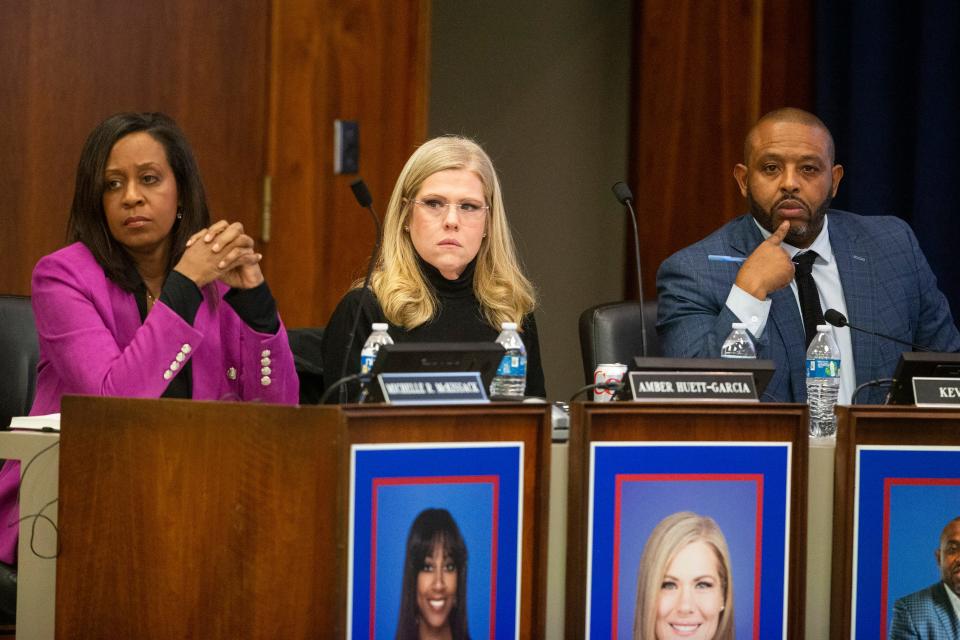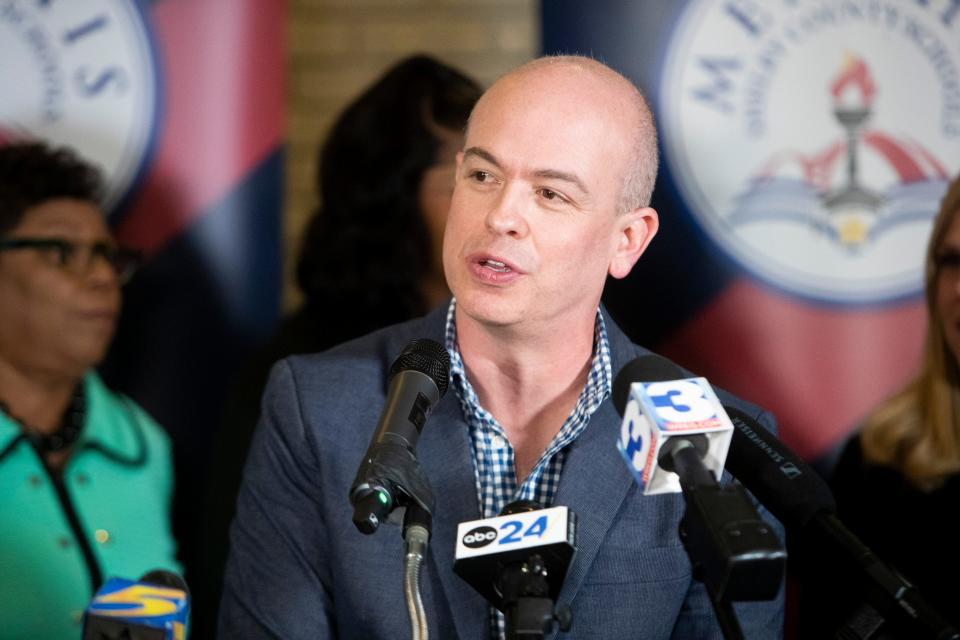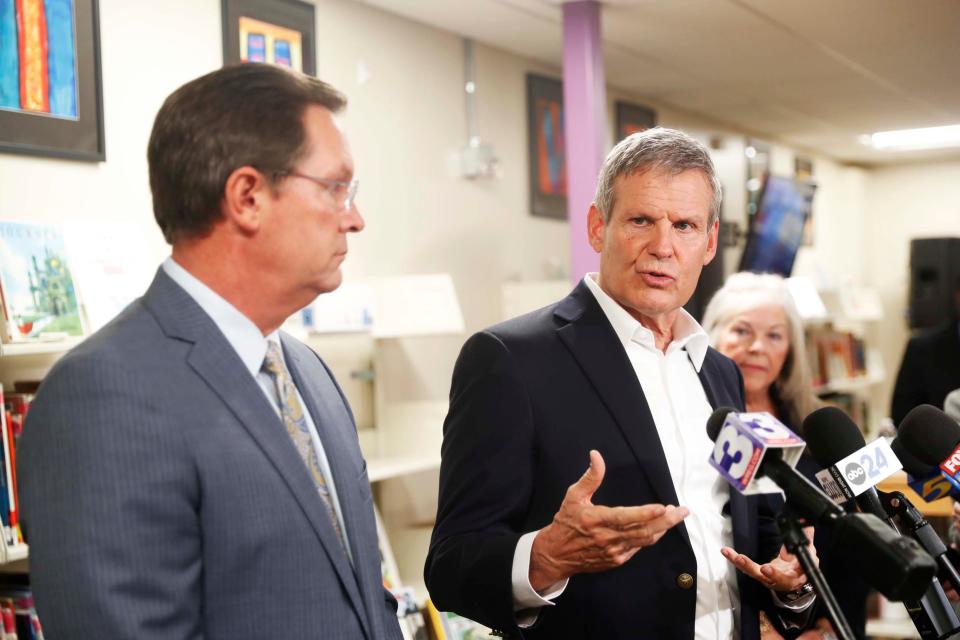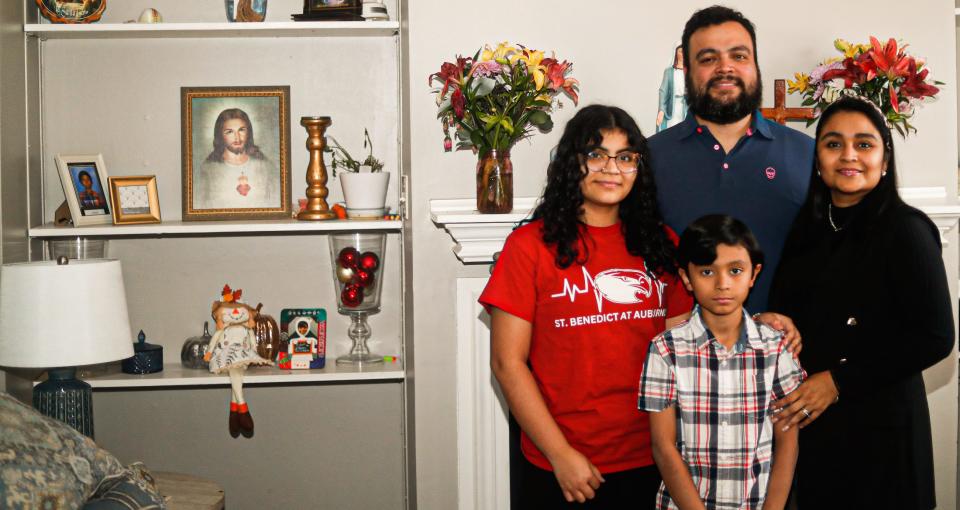'Cannot stay silent:' Memphis school leaders react to TN voucher bill's failure
- Oops!Something went wrong.Please try again later.
On Monday morning, Tennessee Gov. Bill Lee made an announcement ― and it was news he didn’t relish delivering. His proposal for a statewide school voucher program, the Education Freedom Scholarship Act, was dead for the year.
The proposed $144-million bill would have provided $7,075 in state funds to 20,000 students looking to attend a private school in the 2024-25 school year, and Lee had championed it for months.
“I am extremely disappointed for the families who will have to wait yet another year for the freedom to choose the right education for their child, especially when there is broad agreement that now is the time to bring universal school choice to Tennessee," Lee said in a statement. "While we made tremendous progress, unfortunately it has become clear that there is not a pathway for the bill during this legislative session."
For Tennessee’s public education leaders, however, this was a welcome development. Most of them had passionately denounced the proposal after it was revealed in November. On Monday, The Commercial Appeal reached out to local school district officials to get their thoughts on Lee’s announcement.
Here’s what they said.
Schools news: Humes Middle School, MLK College Prep High School in Memphis set to close this year
Appreciation and relief
Public school officials had expressed concern that the bill would ultimately harm public schools, despite Lee’s insistence that the program would be funded separately from public schools. Many also noted that it would send government funds to private schools, which weren’t beholden to the same state assessments and regulations as public ones. And others pointed out that students didn’t necessarily perform better after switching to private schools using vouchers.
So, naturally, there was relief among public school leaders after Lee shared that it didn’t have the support to pass through the state house and senate. In a statement, Collierville Schools expressed its gratitude to lawmakers who had opposed the Education Freedom Scholarship Act.

“Collierville Schools extends sincere appreciation to those legislators who stood with educators, school boards, and others statewide in opposition to legislation that would divert public dollars to private entities,” it said. “Our district and community will continue to advocate strongly for both the high standards and beneficial investments necessary to maintain a strong system of public education in Tennessee.”
The Collierville Schools Board of Education had teamed up with the Collierville Board of Mayor and Aldermen in December to pass a joint resolution urging the Tennessee General Assembly to reject the bill.
Last month, the Memphis-Shelby County Board of Education passed a similar resolution opposing the Education Freedom Scholarship Act, and one of its board members, Amber Huett-Garcia, noted that she was encouraged to see legislators push back against the proposal.

“I haven’t had a single message of support [for the bill], and I’ve had many of concern,” she told The CA. “I'm heartened that [legislators] listened to officials across the state. It's not moving forward, because it didn't have the votes, and not having the votes is a response to listening to constituents.”
Added MSCS board member Mauricio Calvo, in a statement:
“Legislators realized that vouchers, in their backyard, are an empty promise to most students in Tennessee. The bills were based on ideology and not practicality…I have seen how vouchers work under certain circumstances, and they can work as an alternative ― but a single choice can’t realistically be universal or sustainable. The problem is not just ‘public schools.’ The problem is poverty and access to opportunities.”

'Cannot stay silent'
Still, many public school leaders remain leery of what could come next. As Lakeland School System Superintendent Ted Horrell put it: “This is finality only in terms of this legislative session.”
Once lawmakers adjourn for the year, this version of the legislation will be dead, as a new General Assembly will be sworn in after elections this fall. But Lee appears determined to resurrect his voucher expansion proposal next year, saying in his statement that he “Has never been more motivated to provide them [parents and students] with the ability to choose what’s best for their family.”
For Arlington Community Schools Superintendent Jeff Mayo, this is troubling. In a statement, he called the bill’s demise “a small victory,” but said “public school advocates cannot stay silent this next year.” He accused the governor of spending the entire legislative session “trying to strong-arm” the bill through the chambers.
“Even now, Governor Lee has publicly said he’s making plans to revive the bill next legislative session, meaning he hasn’t even taken a day to understand why his signature bill failed,” he said. “That tells me he doesn’t care to listen to our concerns. The end game is to ultimately usher vouchers into Tennessee to fund private schools, despite the lackluster evidence that it will actually help students.”

Horrell also noted that he would likely be ready to push back against a voucher expansion in the future.
“This isn't the first time vouchers has come up, and our school board has voiced our opposition to it historically,” he said. “I would imagine we’d continue to do so, because we don't think it's right for schools or students in Tennessee.”
The hope
But there were elements of the Tennessee House version of the bill, beyond vouchers, that Horrell and other public school leaders supported.
House and Senate Republicans had devised vastly different versions of the plan, and each chamber appeared entrenched in their positions. Senate Republicans wanted to require students who participate in the voucher program to take achievement testing and allow out-of-county public school enrollment.
The House GOP version, meanwhile, sought to make sweeping reforms to public school testing requirements and teacher and principal performance assessments. It also wanted to increase the state’s contribution to teacher health benefits — in addition to establishing the voucher program.
More: Five MSCS school board seats are up for grabs in August. Here's who's running
And Horrell would like to see elements of the legislation taken up ― without vouchers ― next fall.
“Our hope is that in the next legislative session, our legislators will focus on continuing to work towards adequately funding public schools, and possibly taking out some of the more popular aspects of proposed legislation that were supported by a majority of educators, including reducing the burden of assessment, teacher evaluation, and improving funding for unfunded mandates,” he said.
Mayo also acknowledged that there were elements of the House version of the bill that could have benefited public education, though he expressed his frustration that they were included in a voucher bill.
“It’s equally as troubling that the House version of the voucher bill acknowledged that public school accountability is broken and needs fixing, yet we only stood to receive that relief if vouchers passed,” he said in his statement. “Now that the bill has failed, these onerous accountability measures will stay in place, with lawmakers publicly acknowledging they aren’t working.”

Huett-Garcia, for her part, would like to see the state incorporate more input from public school leaders ― especially with Lee poised to bring back his voucher plans in the future.
“It's part of his vision for the state, so I expect it to come back,” she said. “I hope there's more upfront input into what it could look like. Really, boards and local governments have to have to do the implementation. They have to manage the implications of finances. I would love to see the governor and our key legislative officials actually bring school board members together.”
Those in support
Though public school leaders and many community stakeholders opposed Lee’s voucher proposal, there were parents and students who supported it.
In 2022, the state implemented Lee’s other voucher initiative, the Education Savings Account program, which offers 2,400 students in the Shelby, Davidson, and Hamilton counties about $9,000 in state funds to cover tuition and other expenses at private schools. Feedback for the first year of the ESA program was overwhelmingly positive, with 91% of parents who completed the Tennessee Department of Education's survey saying they were satisfied with their student's academic growth.

In December, Lee and Tennessee House Speaker Cameron Sexton spoke at New Hope Christian Academy, where they were joined by ESA recipients who effusively praised the program. And in March, The CA spoke to the Riveras, an immigrant family from Honduras who had two children attending Catholic schools with ESA funds.
“You register your children where you want them to study,” Christian Rivera said. “If the state is giving me a chance to give them a better education, I’ll take it.”
This article originally appeared on Memphis Commercial Appeal: Memphis school leaders react to Tennessee voucher bill's failure

